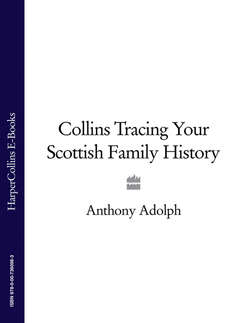Читать книгу Collins Tracing Your Scottish Family History - Ryan Tubridy, Anthony Adolph - Страница 30
Nicknames
ОглавлениеWhere a surname was very common, families might add an extra nickname or ‘tee name’. In her excellent Scottish Family Tree Detective (Manchester University Press, 2006), Rosemary Bigwood notes some north-east coast families being known by their surname followed by the name of their fishing boat, whilst in the Hebrides Bill Lawson noted extra surnames such as Kelper (kelp harvester), Clachair (mason) and Saighdear (soldier, usually used of an army pensioner). The MacLeod descendants of John MacLeod from Muck, who settled in Harris in 1779 as a gardener, are known locally as MacLeod na Gairneileirean, or just na Gairneileirean, ‘the Gardeners’.
Other nicknames were from characteristics, such as Dubh (black-haired) and Ruadh (redhaired). Red-haired Angus MacDougal might thus be known as Angus Ruadh Mac Dougal, or Angus Mac Dougal Ruadh. In the Lowlands, when the patronymic system died out nicknames could become people’s only surnames, such as Duff (from Duhb) or Cruikshanks (‘crooked legs’). Many people also became known by where they lived – Cairncross, Cairns, Cladcleuch and so on, some with interesting twists: the Caithness family aren’t from Caithness, but from Kettins in the barony of Angus.
The writer Sir Walter Scott (1771-1832). His surname means literally ‘Scot’ and was borne by a great clan on the English-Scots borders.
